Switch to Solar Power and Be A Winner!
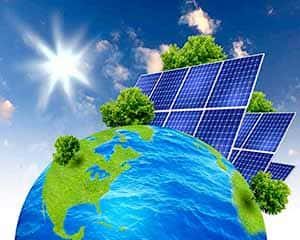 Portable solar power system is the way energy generated from the sun in either electric or thermal forms. Different ways can be used to capture solar energy but the use of photovoltaic solar panels is the most common method. Besides using photovoltaic solar panels to convert sun rays into usable electricity, solar energy can also be used in thermal applications like heating indoor spaces or fluids. As technology advances, experts are relying on the use of advanced technology in solar panels and portable solar power to increase efficiency and reliability. If you are interested in solar power, there are three main scales that you can choose from: residential, commercial and utility.
Portable solar power system is the way energy generated from the sun in either electric or thermal forms. Different ways can be used to capture solar energy but the use of photovoltaic solar panels is the most common method. Besides using photovoltaic solar panels to convert sun rays into usable electricity, solar energy can also be used in thermal applications like heating indoor spaces or fluids. As technology advances, experts are relying on the use of advanced technology in solar panels and portable solar power to increase efficiency and reliability. If you are interested in solar power, there are three main scales that you can choose from: residential, commercial and utility.
Residential scale solar is mainly installed in open land (ground-mounted) or on rooftops of homes. This scale produces 5 to 20 kilowatts (kW) depending on the size of the property. On the other hand, commercial-scale projects are installed at a greater scale when compared with residential-scale solar. The main objective of commercial-scale projects is to provide onsite solar power to businesses or non-profits although individual installations can vary greatly in size. Finally, utility-scale projects are usually large because they produce several megawatt (MW) installations that provide reliable solar energy to numerous utility customers.
How do solar panels work?
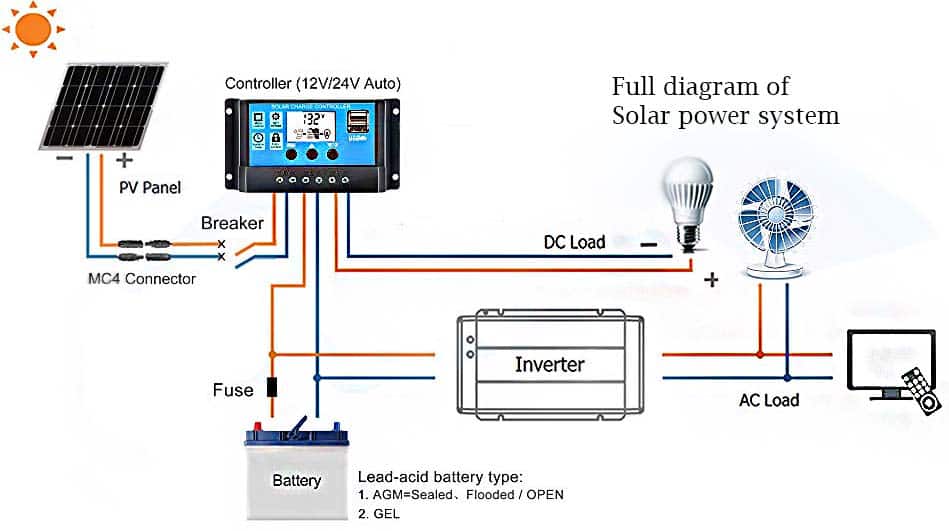 Solar panels work by allowing photons to knock electrons free from atoms thus generating electricity flow. The surface of a portable solar panel is divided into smaller cells that are known as photovoltaic cells. Each of these cells is sandwiched between two slices of semi-conducting material (mainly silicon). For the photovoltaic cells to convert sunlight into electricity, an electric field should be created. Therefore, manufacturers use other materials alongside silicon to give each slice of the sandwich either a positive or a negative charge.
Solar panels work by allowing photons to knock electrons free from atoms thus generating electricity flow. The surface of a portable solar panel is divided into smaller cells that are known as photovoltaic cells. Each of these cells is sandwiched between two slices of semi-conducting material (mainly silicon). For the photovoltaic cells to convert sunlight into electricity, an electric field should be created. Therefore, manufacturers use other materials alongside silicon to give each slice of the sandwich either a positive or a negative charge.
Phosphorous element is seeded into the top layer of the silicon to add electrons thus create a negative charge while the bottom layer is seeded with boron elements thus resulting in fewer electrons (positive charge). With such an electric field, when a photon (particles of light) knocks on a free electron, the electric field pushes the electron out of the silicon junction. It is important to understand that the solar panel produces DC electricity which is then converted by the grid inverter into AC electricity. The alternating current is then channeled through thin metallic strips (busbars) and stored in a battery. Since the grid can produce more power than what’s being consumed by the household, the surplus power is transferred into the mains power grid. If you invest in solar power, you need to understand basic maintenance practices. For instance, you are required to change or replace battery acid regularly, ensure the wiring is done well, etc.
Benefits of solar power
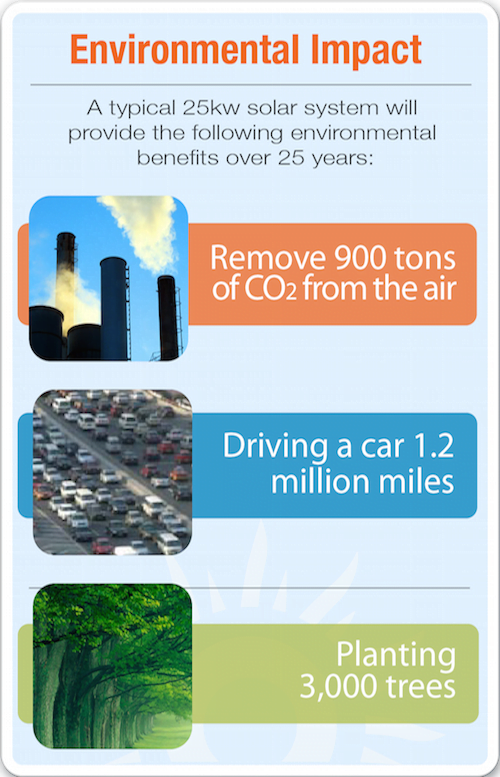
Solar energy is derived from the radiation of the sun. The sun is the most powerful source of energy on earth and this energy can be harnessed by installing portable solar panels. In the past, solar energy was criticized for being expensive (installation) and not being efficient. However, over the years, improved technology has increased solar power efficiency, reduced the cost of installation and increased reliability through the use of solar battery storage systems. Therefore, solar energy has emerged to be very beneficial not only for the environment but also in the financial aspect. Pros of solar power include:
i. Reduce energy bills – solar energy is a renewable source of energy, therefore, it can be harnessed in all areas and it is available every day. With solar panels, you can generate your power thus reduce the utility bills because you will not rely on your utility (power) provider. Nowadays, solar power is affordable especially due to advancements in technology that allows us to harness more power. The amount of money you save on utility bills depend on the size of your solar panels and your electricity or heat usage.
ii. Solar power can be used everywhere – you can generate solar energy anywhere on earth provided there is sunshine. Hence, you can rely on solar energy in remote areas which are not easily accessible or have no other sources of energy. In case you are camping in a remote area that has no electricity, you can rely on a portable solar panel to harness solar energy.
iii. Impact on the environment – solar energy does not have any effect on the environment because it does not emit harmful gases that cause pollution. Therefore, to reduce the chlorofluorocarbons (CFCs) in the atmosphere, we should rely on solar energy. Also, generating solar energy does not cause noise pollution thus it’s an ideal source of energy in both rural and urban areas.
iv. Solar energy can be used in case of emergency – power failure or loss is a normal occurrence whether you are camping or at home. If you have invested in portable solar panels and batteries, you will not have any power problems.
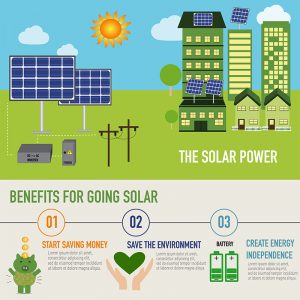
v. Diverse applications – solar energy can be used for a variety of uses. You can either generate electricity (photovoltaic) or heat (solar thermal) depending on your energy needs. Just like electricity, solar energy can be used for different purposes like generating electricity, distill water and to power satellites in space.
vi. Low maintenance costs – although the initial cost of installation can be high, solar energy systems do not require a lot of maintenance. The only maintenance practices required are:
· Changing the inverter after 5 to 10 years
· Ensuring that the solar panels are clean to harness solar energy
· Maintaining the batteries e.g. by changing the acid
· Maintaining the cables to ensure efficiency
If you cannot manage to carry out these maintenance practices, you need to hire a specialist or a professional company to do it for you.
vii. Technology development – technology in the solar power industry is constantly advancing and more improvements will be realized in the future. Further innovations in nanotechnology and quantum physics can potentially increase the effectiveness of solar panels by doubling or even tripling the electrical input.
Why should you rely on solar power system?
Portable solar power systems are usually smaller when compared to the systems that are designed for commercial use. Therefore, here are the reasons why you should consider investing in a portable solar power system for your household or when camping:
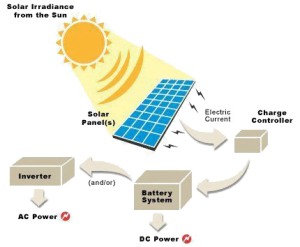 · Easy to install – portable solar panels are small and come with additional features that make their use easy. For instance, they have a foldable stand that can be folded with ease before or after using or setting up the system.
· Easy to install – portable solar panels are small and come with additional features that make their use easy. For instance, they have a foldable stand that can be folded with ease before or after using or setting up the system.
· Solar power systems utilize lower voltage thus providing both a safer usage and installation.
· These systems have a backup – nowadays, most solar generators have a battery backup that stores power to keep the system operating. Therefore, even if there is no sunshine for a couple of days, you will still have power.
· You don’t need trenching – if you are relying on solar energy to power an appliance e.g. a security camera, you don’t need trenching because each system stands alone and can be mounted anywhere.
· Durability – technological advancement has led to the development of durable solar systems thus saving the cost of repairing or replacing the system. For instance, the glass used to manufacture solar panels is efficient and durable.
Disadvantages of solar energy
Even if solar energy has numerous benefits, there are certain disadvantages which makes some people prefer using other sources of energy. Some of the disadvantages are: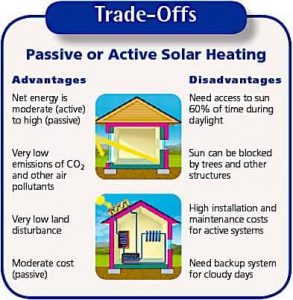
i. Cost – the initial cost of buying and installing a solar energy system is fairly high, especially with the current technological developments. If you are considering investing in solar energy, you will have to buy solar panels, batteries, wiring, inverters and pay installation costs. However, since solar technology is developing constantly, the prices might go down in the future.
ii. Weather dependent – even though solar energy can be collected during cloudy and rainy days, the efficiency of the solar system drops significantly. Solar panels rely on sunlight to gather solar energy. Ergo, cloudy or rainy days may affect the entire system. Remember, solar energy cannot be collected at night because of the sun’s absence. Hence, if you want to use solar energy to heat water at night or during the winter season, investing in thermodynamic panels is the best option.
iii. Storing solar energy is expensive – to store solar energy, you need to buy batteries. These batteries are not cheap to buy and maintain and hence it is advisable to rely on solar energy during the day and use the grid at night (remember you need to be connected to the grid to use this option).
iv. Requires a lot of space for grid-connected system – the higher your electricity needs, the more solar panels you need to install to collect as much sunlight as possible. This might be a problem because you may need a lot of space. Some roofs are not big enough or their design limits the number of solar panels you would install. Hence, you will have to look for a perfect spot to install the solar panels, for instance, your yard. Ensure that the spot is safe and the sunlight isn’t obscured by tall trees or buildings.
Portable solar power components and accessories
A portable solar power system is made up of several components that include:
1. Portable Solar panels
 A solar panel can be termed as a major component of a solar system. It converts the sun’s radiation into an electric current that is then used to provide power or electricity for households. Solar panels are made of a collection of numerous small solar cells that are spread over a large surface in order to provide more power. When there is a lot of sunshine that hits the cells the more power is produced.
A solar panel can be termed as a major component of a solar system. It converts the sun’s radiation into an electric current that is then used to provide power or electricity for households. Solar panels are made of a collection of numerous small solar cells that are spread over a large surface in order to provide more power. When there is a lot of sunshine that hits the cells the more power is produced.
Solar panels utilize the solar photovoltaic (PV) effect to convert light photons into electricity. These panels use layers of silicon, which is a semiconductor. The PV is measured by kilowatts peak (KWp), which is actually a measure of the rate of solar panels produce energy at their peak performance with direct sunlight hitting it.
2. Portable solar generator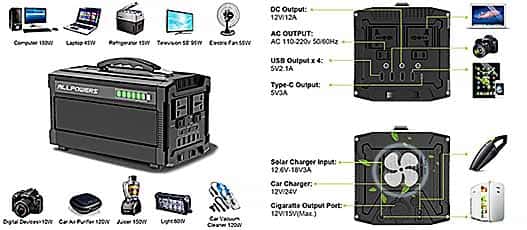
A Portable solar power generator is a form of a backup where off-grid systems use a battery to store excess energy produced during the day. The stored energy prevents power shortage at night or when there is insufficient sunshine during the day. Portable solar generators have inverters which convert direct current (DC) energy that’s generated from the solar panels into alternating current (AC) power that’s used in households.
3. Inverter
This component converts DC voltage into AC voltage that’s ideal for use in powering appliances rated at the AC mains voltage. The inverter can either be built as a standalone component or as a back-up for power supply from the batteries depending on the system you have installed. However, an inverter includes an oscillator, drive circuit, control circuit, switching devices, and a transformer.
4. Charging kit/charge controller
This component regulates voltage thus help in keeping the battery from overheating. If the voltage is not regulated, batteries can get damaged by overheating. Normally, batteries require about 14 volts to charge fully while most solar panels produce about 16 to 20 volts which can damage storage batteries. Therefore, a charging kit regulates the current or voltage coming from the solar panels before channeling it to the battery.
5. Batteries (Deep cycle)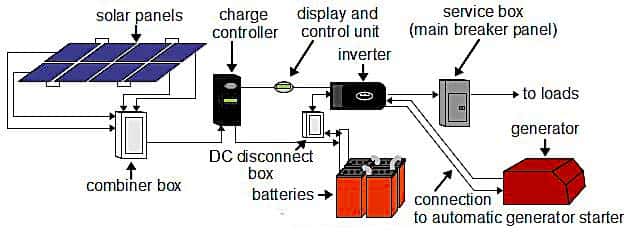
Solar batteries store the excess energy generated by the solar panels. The energy is stored in DC form and it can be used later. Batteries increase the reliability of solar energy because you can use the stored energy to power your appliances.
6. Circuit breakers
Circuit breakers are used to protect the wiring from overheating and/or catching fire in case of a short circuit. Also, the circuit breakers protect your appliances from overheating, catching fire or becoming completely damaged if there is a short circuit.
Final Thoughts
With all the pros listed above, investing in a portable solar panel charge kit or Portable solar power system is the right move. The system will not only make your life easy and comfortable but also help you lower your energy bills either at home or while doing some outdoor activities such as camping, RV etc. However, since there are different types of portable solar panels, thorough research is needed to gather important information. Compare the different types of solar panels in the market, consider your budget and get a professional opinion from an expert to help you make the right choice. Finally, reading reviews and comments from other users before making the final choice can help you determine the reliability of the portable solar power system.
